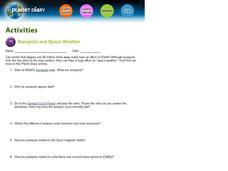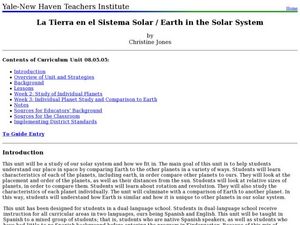Curated OER
Solar System
Explore the solar system in detail, from it's origins to its components. Visual data gathered by actual space missions has been used to create the images and animations on each page of this stellar electronic book about the solar...
Curated OER
Making Regolith
You may not be able to take a field trip to the moon, but that doesn't mean your class can't study moon rocks. Using graham crackers as the moon's bedrock and powdered donuts as micrometeorites, young scientists simulate...
Center for Math and Science Education
Pocket Solar System
How in the world can something as big as the solar system possibly fit in your pocket? Complete this simple modeling activity and find out, as young scientists gain an appreciation for the incredible scale of outer space.
Center for Math and Science Education
Solar System Launch
Trying to understand the vastness of outer space can be quite a challenge for young scientists. Help put things in perspective with this cross-curricular activity as students work in pairs creating scaled models of...
PHET
My Solar System
Orbit diagrams appear to be a work of mathematical art. The simulation helps scholars build their own systems of planets, stars, moons, etc., to observe their orbits. By altering their positions, velocities, and masses, a variety of...
Laboratory for Atmospheric and Space Physics
Jupiter’s Relative Size
How do you properly illustrate the extreme size difference between two planets—Earth and Jupiter? With the help of jellybeans, of course! Create a scale model of Jupiter's mass compared to Earth using a fishbowl, 1,400 beans, and a...
Laboratory for Atmospheric and Space Physics
Planetary Distances on the Playground
There's no need to stay inside; get out of the classroom and create a scaled map of the solar system on your playground field! In collaborative groups, scholars identify the distance between the sun and other planets, place planet...
Laboratory for Atmospheric and Space Physics
A Classroom Solar System
Create a scaled model of our solar system in your classroom! Scholars work collaboratively to build paper mache planets and hang them in their proper position to showcase each planet's location in the solar system.
University of Colorado
Planetary Distances on the Playground
Earth is 149,600,000 km, or 92,957,130.4 miles, from the sun. Young astronauts create an interactive model to learn the distances between planets. Nine groups, each representing a different planet, are spread around at class-calculated...
Laboratory for Atmospheric and Space Physics
Where Are We Going?
Come take a ride on the space bus! Scholars go on an imaginary trip to pick up their peers from the inner and outer planets while reinforcing math skills. First, learners round decimals to identify each planets' distance from Earth....
University of Colorado
Space Travel Guide
Neptune takes 164.8 Earth years to travel around the sun. In the fifth of 22 lessons, young scientists create a travel guide to a planet in our solar system. They provide tips for others on what to bring, what they see, and their...
Vosonos
Interactive Minds: Solar System
Travel through space as you learn about the galaxy, solar system, planets, and much more. An extensive resource for studying astronomy in upper-elementary and middle school classrooms.
Super Teacher Worksheets
Our Solar System Scavenger Hunt Activity
Send students on a search for facts about the solar system with this scavenger hunt activity. Whether they are finding out how far the sun is from the earth, or the names of all four gas giants, this resource will engage young...
Space Awareness
History of the Universe
Your pupils may believe that you and their parents are the oldest things in the universe, but surprise! There are elements of the universe that are even older. Elementary scientists create a class timeline to demonstrate the...
Oregon State
World Map of Plate Boundaries
Young geologists piece together the puzzle of plate tectonics in an earth science lesson. Given a physical map of the world, they search for land formations that indicate the location of different types of plate boundaries.
Curated OER
Planet Sun Catchers
Students create suncatchers that resemble planets using recycled plastic lids.
Curated OER
Solar System and Planets
Students identify the main components of the solar system. In this earth science lesson, students order the planets according to their distances from the Sun. They differentiate planets from dwarf planets.
Curated OER
Planet Research and Brochure
Fourth graders design a brochure based on the planet that they researched. For this planets lesson plan, 4th graders include the data, important facts, and completed as a team.
S2tem Centers SC
Seasons
Winter, spring, summer, and fall—take the learning of the seasons beyond the elementary level to the middle school classroom. Curious learners begin by watching videos about the seasons and the rotation of planet Earth. Then,...
Curated OER
Bringing the Solar System to Life
Students make models of the planets and use the models to show revolution of the planets around the sun. They explain the rotation of the planets after demonstrating with balloons.
Curated OER
Sunspots and Space Weather
This assignment is out of this world! It is an online worksheet about sunspots and solar cycles, a sort of WebQuest if you will. Links to two NASA websites and spaceweather.com are written into the questions so that your aspiring...
Curated OER
Day and Night
Inform your elementary scientists why we experience day and night. They are provided with facts and explanation as to why the day and night cycle occur, discuss what they've learned with a partner, and are then given the task of writing...
California Academy of Science
Energy: A Day in My Life
If only we could harness the energy of fifth graders, our energy problems would be over! The class discusses where different forms of energy come from and how we use them. They complete a chart of the activities that they do daily...
Curated OER
Earth in the Solar System
A three-week unit designed to be completed in an elementary level, dual-language immersion classroom, this resource includes several lessons intended to introduce young learners to the solar system, the Earth and how the Earth compares...























